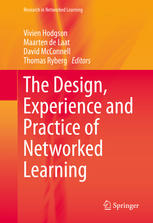

Most ebook files are in PDF format, so you can easily read them using various software such as Foxit Reader or directly on the Google Chrome browser.
Some ebook files are released by publishers in other formats such as .awz, .mobi, .epub, .fb2, etc. You may need to install specific software to read these formats on mobile/PC, such as Calibre.
Please read the tutorial at this link: https://ebookbell.com/faq
We offer FREE conversion to the popular formats you request; however, this may take some time. Therefore, right after payment, please email us, and we will try to provide the service as quickly as possible.
For some exceptional file formats or broken links (if any), please refrain from opening any disputes. Instead, email us first, and we will try to assist within a maximum of 6 hours.
EbookBell Team

4.8
84 reviewsThe Design, Experience and Practice of Networked Learning
Edited by: Vivien Hodgson, Maarten de Laat, David McConnell and Thomas Ryberg
This book brings together a wealth of new research that opens up the meaning of connectivity as embodied and promised in the term ‘networked learning’. Chapters explore how contexts, groups and environments can be connected rather than just learners; how messy, unexpected and emergent connections can be made rather than structured and predefined ones; and how technology connects us to learning and each other, but also shapes our identity. These exciting new perspectives ask us to look again at what we are connecting and to revel in new and emergent possibilities arising from the interplay of social actors, contexts, technologies, and learning.
Caroline Haythornthwaite, University of British Columbia
Despite creating fundamentally new educational economics and greatly increasing access - teaching and learning in networks is a tricky business. These chapters illuminate the complex interactions amongst tools, pedagogy, educational institutions and personal net presences – helping us design and redesign our own networks. In the process, they take (or extract) network theory from the practice of real teaching and learning contexts, making this collection an important contribution to Networked Learning.
Terry Anderson, Athabasca University
What kinds of learning can social networking platforms really enable? Digging well beneath the hype, this book provides a timely, incisive analysis of why and how learning emerges (or fails to) in networked spaces. The editors do a fine job in guiding the reader through the rich array of theories and methods for tackling this question, and the diverse contexts in which networked learning is now being studied. This is a book for reflective practitioners as well as academics: the book's close attention to the political, pedagogical and organisational complexity of effective practice, and the lived experience of educators and learners, helps explain why networked learning has such disruptive potential — but equally, why it draws resistance from the establishment.
Simon Buckingham Shum, The Open University
The networked learning conference, a biannual institution since 1998, celebrates its 14th year in this volume. Here a range of studies, reflecting networked learning experiments across Europe and other global contexts , show important shifts away from a conservative tradition of Œe-learning¹ research and unpeel dilemmas of promoting learning as an elusive practice in virtual environments. The authors point towards important futures in online learning research, where notions of knowledge, connectivity and Œcommunity¹ become increasingly elastic, and engagements slide across material and virtual domains in new practices whose emergence is increasingly difficult to apprehend.
Tara Fenwick – University of Stirling.
The chapters in this volume explore new and innovative ways of thinking about the nature of networked learning and its pedagogical values and beliefs. They pose a challenge to us to reflect on what we thought networked learning was 15 year ago, where it is today and where it is likely to be headed.
Each chapter brings a particular perspective to the themes of design, experience and practice of networked learning, the chosen focus of the book. The chapters in the book embrace a wide field of educational areas including those of higher education, informal learning, work-based learning, continuing professional development, academic staff development, and management learning.
The Design, Experience and Practice of Networked Learning will prove indispensable reading for researchers, teachers, consultants, and instructional designers in higher and continuing education; for those involved in staff and educational development, and for those studying post graduate qualifications in learning and teaching.
This, the second volume in the Springer Book Series on Researching Networked Learning, is based on a selection of papers presented at the 2012 Networked Learning Conference held in Maastricht, The Netherlands.